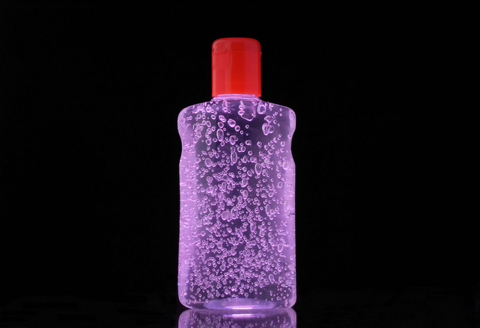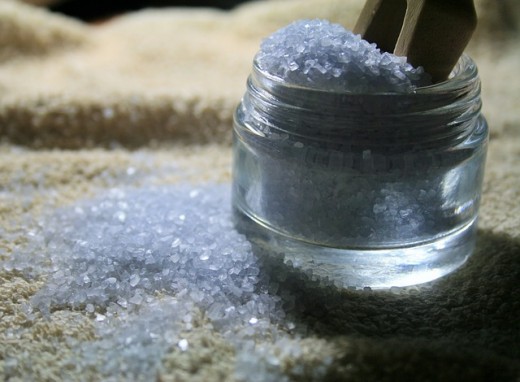Soothe Dry, Itchy Winter Skin Naturally
Lock in Moisture Naturally

Winter is here again and while it may be a wonderland outside your window, it's secretly sucking the moisture from your skin.
Those blustery breezes can make exposed skin raw, red, and irritated. Spending more time indoors with the heat on dries out your environment and therefore, your skin.
You don't need expensive lotions to treat dry, itchy winter skin. As a matter of fact, many commercial lotions can worsen your dry skin over time. This is because many of these products contain mineral oil, which may make skin feel smooth, but won't heal damaged skin. It only temporarily masks its symptoms.
These natural techniques can offer lasting relief for dry winter skin and improve the skin conditions you have, instead of just covering them up.
1. Start with Your Diet
If you eat a lot of highly-processed foods, you're not only worsening your dry skin, you're damaging your health. When your body does not get the nutrients it needs, the evidence can bubble to the surface in the form of acne, eczema, psoriasis, and dry, cracked skin.
Sardines, herring, anchovies, and wild-caught Alaskan salmon contain omega-3 fatty acids, which helps control inflammation and moisturizes skin from the inside out. If fish doesn't suit your taste, you can always add a high-quality krill oil supplement to your diet instead.
Organic fruits and vegetables offer vitamins, minerals, and antioxidants that help you maintain good overall health.
Health begins in the gut. This is why you should also include fermented foods in your diet. They help regulate your digestion, which helps clear out built-up toxins that can have a negative effect on your skin.
Don't forget to drink plenty of water too!
Quick Tutorial Video on Dry Skin Brushing
2. Brush Your Skin
Using a dry skin brush before bathing stimulates both blood and lymph circulation, which helps your body eliminate built-up toxins.
Dry skin brushing also exfoliates away dead skin cells, so smoother, healthier skin can emerge. When using your dry skin brush, use gentle pressure. Your skin should be slightly pink afterward, not even more red and raw.
3. Exfoliate with Baking Soda
Once a week, mix a bit of baking soda with your usual face wash and warm water. Gently scrub your face in circular motions for a full minute. Rinse thoroughly, then apply a natural moisturizer.
The Best Coconut Oil
4. Trade Your Body Lotion for Coconut Oil
A lot of commercial moisturizers contain mineral oil, which can dry out your skin over time. Also, have you ever turned over the bottle and read the ingredients list?
They often contain a paragraph of unpronounceable ingredients such as:
Hydrolysed Animal Protein, Cocoyl Sarcosine, 2-bromo-2-nitropropane-1,3-diol, Imidazolidinyl Urea, Quaternium-7, 15, 31, 60, etc., Lauryl Sarcosine, Sodium Lauryl Sulfate, Ammonium Lauryl Sulfate, Ammonium Laureth Sulfate, Sodium Laureth Sulfate, and Sodium Methyl Cocoyl Taurate
These particular additives belong to a class of chemical compounds called nitrosamines, which have been shown to be carcinogenic.
When you give up your current body lotion for 100% raw, organic coconut oil, you'll never want to go back. This completely natural oil not only locks precious moisture into your skin, it also has antiviral, antibacterial, and antiprotozoal properties that can shield you from common colds and flu.
How Often Do You Shower?
5. Shower Every Other Day
Showering every other day may sound gross at first, especially if you're fastidious about bathing. But each long, hot shower you take can draw more moisture from your skin. It also strips away your skin's natural protective layer, which can leave you more vulnerable to infection.
If you feel you really can't go without a shower every day, turn the temperate down a bit and don't stay in too long. As soon as you get out, pat your skin dry with a towel and apply coconut oil immediately.
Triclosan Can Harm Your Health!

6. Go Easy on the Antibacterial Products
Antibacterial soaps and hand sanitizers not only dry out your skin, they can even increase your chances of coming down with something this season.
This is because they contain a synthetic antibacterial agent called triclosan that has been linked to lowered immunity and antibiotic-resistant disease.
Triclosan has also been linked to disrupted muscle function, which can cause your heart and skeletal muscles to fail gradually over time.
If you've touched something truly disgusting and use an antibacterial soap or hand sanitizer just that one time, you should be fine. But non-antibacterial soap works best for everyday hand washing. As for hand sanitizers, look for ones that use alcohol as their primary disinfectant, not triclosan.
7. Use a Humidifier
A humidifier in your home can help put moisture in the closed-in space around you. This not only helps keep your skin moisturized, but your nasal passages as well, which may give you a better chance to fight off colds and flu.
8. Wear Dish Gloves
Unless you have a dishwasher, you wash your dishes by hand. In the summer, there's no problem. In the winter, your knuckles become so dry and cracked, they may even bleed. Invest in a good pair of dish gloves to keep hot, soapy water from turning your hands to sandpaper.
9. Cover Up When You Head Out
When the air turns frigid, it can damage and dry your skin. Cover up your hands and face with gloves and a scarf before going out into those winter blasts. You may also want to put coconut oil on the parts of your skin that you couldn't cover up when you're back indoors.
Epsom Salt Soothes

10. Soak in Epsom Salt
Epsom salt is magnesium sulfate, which gently exfoliates and softens skin. Pour a hot bath and add a cup or two of Epsom salt, soak for 20 minutes, rinse your skin of any remaining salt, pat yourself dry, and apply coconut oil to lock in moisture.
Important Note: If you're allergic to sulfur, do not take Epsom salt baths. If you're pregnant or diabetic, consult your physician first.
Dry, itchy winter skin can be a pain (literally). These natural tips can help keep your skin glowing and healthy every day of the year.









